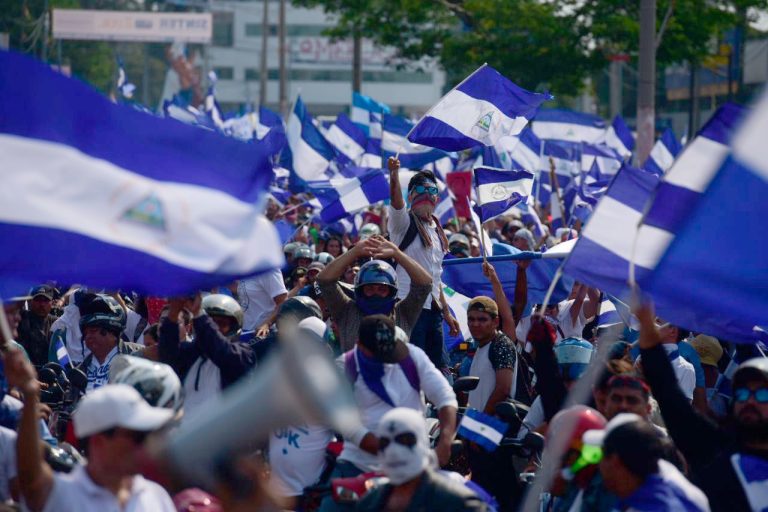1 de octubre 2019

Children of Exile: The Births “Sowing Hope” in the Camp of Nicaraguan Farmers

PUBLICIDAD 1M
PUBLICIDAD 4D
PUBLICIDAD 5D
Special Commission and OAS General Secretariat confirm to an opposition delegation that there will be no electoral reforms without consensus

The members of the High-Level Commission of the Organization of American States (OAS) and the General Secretariat of the organization, chaired by Luis Almagro, ratified to a large group of Nicaraguan opponents who were in Washington last week, that there are not two parallel agendas in the organization and that they have only one objective: to seek and contribute to a peaceful and negotiated solution to the crisis Nicaragua is experiencing since April 2018. This week, in El Salvador, the opposition delegation and the OAS Commission will hold new meetings.
“What we perceive is that the commitment between the General Secretariat and the OAS Commission is a shared commitment to seek restitution of rights and an inclusive electoral reform, these two issues are being worked hand in hand. In fact, the delegate of the Secretariat, Gonzalo Koncke was present at the meeting with the Special Commission,” the President of the Superior Council for Private Enterprise (COSEP), Jose Adan Aguerri, a member of the opposition delegation that was in Washington, told Confidencial.
The restoration of rights means, according to Aguerri, includes the release of the remaining political prisoners, that Nicaraguans can protest and have freedom of expression without being besieged by the Police, and an inclusive electoral reform with consensus among all sectors.
Aguerri said they told the Commission that there are people who are part of the Inter-American Commission on Human Rights (IACHR) list, that the government agreed to release “and there are nine people who were released and are incarcerated again.”
Although the State of Nicaragua does not recognize the OAS Special Commission and prevented its entry into the country two weeks ago, they will continue trying to “establish communication channels with the State of Nicaragua and negotiate a democratic solution in Nicaragua,” said the student Levis Rugama, a released political prisoner who was also part of the delegation.
Rugama said that they will meet as of Tuesday in El Salvador with members of that Commission made up of representatives from the United States, Canada, Argentina, Paraguay and Jamaica, to continue informing about the situation of Nicaragua.
The Commission has the mandate of the OAS foreign ministers to seek contacts at the highest level with the government of Daniel Ortega, to seek a peaceful and negotiated way out of the crisis and in 75 days it must submit a report with its recommendations. So far it is unknown if they have already met in another country with government officials.
“They (the Commission) wants to initiate a new dialogue,” said an anonymous source who participated in the meetings.
“It is a fact, that who has been saying no to the dialogue is the Government and we have made it clear (to the Commission) what that negation means for Nicaraguans, that they continue to say no to the restitution of citizens rights and to continue saying no to those unilateral electoral reforms,” the source said.
“The Commission members are concerned about the situation in Nicaragua,” said Rugama. “Almagro is also clear of the serious situation of violence, of human rights violations in the country and of the state of exception and rupture of the constitutional order.”
Agueri said that the presence of a broad sector of the Nicaraguan opposition with a single objective in Washington aroused much hope in the US capital.
The delegation included representatives of the students, peasants, civil society and business people. They met with White House officials, congressmen, senators, participated in think-tanks events, among others.
The opponents of the Ortega regime also stressed to the international community that more sanctions are needed to force the dictatorship to negotiate a democratic solution to the crisis that erupted in April 2018, when the dictatorship began to repress peaceful protests leaving at least 326 people died, the majority at the hands of the Police and government paramilitaries, documented by national and international human rights organizations.
According to Aguerri, it was very important that in all the meetings they held, they always gave a message of unity. However, this unity has not yet been formally achieved.
“Currently the opposition is at an important crossroads,” said Rugama. “There are clear and obvious internal factions contesting the position of the blue and white leadership.”
The student maintains, however, “it is positive to know that they are talking internally” to achieve unity.
Archivado como:
PUBLICIDAD 3M
Periodista. Tiene 16 años de experiencia como reportero de prensa escrita y televisión. Escribe sobre crimen organizado, derechos humanos y política. Premio a la Excelencia Periodística Pedro Joaquín Chamorro.
PUBLICIDAD 3D